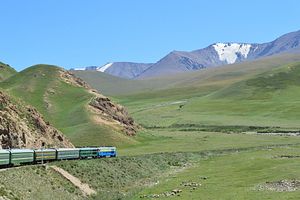In the late 20th century, the acceleration of globalization, and especially the end of the Cold War, which had hindered exchange between East and West, created the necessary conditions for the revival of the famed Silk Road. Since the 1990s, many railways, roads and pipelines have been put into operation or under construction along that ancient route, not only contributing to economic, trade and cultural exchange among the countries of the region, but also having a significant impact on the geopolitics of Eurasia.
Rail, in particular, is expected to nurture trade between China and countries far to the west, such as Azerbaijan, as well as within Central Asia, bolstering China’s presence there and benefiting the region.
Take the Baku-Tbilisi-Kars (BTK) project. On November 21, 2007, the presidents of Azerbaijan, Georgia and Turkey inaugurated the construction of a new rail link between Kars and Baku, via Tbilisi. The project is designed to facilitate shipping of cargo between Asia and Europe, and will connect the railway networks of Central Asia, the Caucasus and China with those of Azerbaijan and Europe.
The BTK railway will have an international impact, as it transports goods from Asia to Europe. It is expected to transport 1.5 million passengers and 3 million tons of freight per year. Forecasts predict that by 2034 it will transport 3 million people and more than 16 million tons of goods.
The BTK railway is slated for completion in 2014, at an estimated total cost of $500 million. Connecting China, Central Asia and Europe, it will create a transport corridor and one continuous connection from Shanghai to London. The new line should bolster the transportation capacity of the South Caucasus and diversify the nature of the goods that are shipped through these three countries to world markets.
On September 7, 2013, Chinese President Xi Jinping made a speech in the Nazarbayev University of Kazakhstan and proposed the strategic concept of jointly building a Silk Road Economic Zone. He offered five specific initiatives: strengthen policy communication, connect roads, keep trade smoothly flowing, facilitate the circulation of currency, and keep the people connected. It is a modern reincarnation of the ancient Silk Road. As transit points, Central Asian countries can gain considerable economic benefits from a new Silk Road, reducing their dependence on Russian transport lines, and attenuating the northern giant’s geopolitical leverage over the region.
This new Silk Road will be made of steel. The BTK project is not the only rail link being considered. China and Turkey have discussed constructing a high-speed railway that would stretch across Turkey. This would be the largest railway project in Turkey, running from Kars, the easternmost city of Turkey on the border with Armenia, crossing to Istanbul. It would then connect with the Marmaray railway tunnel being constructed across the Bosphorus strait, before finally reaching Edime, a city near the border of EU member countries Bulgaria and Greece.
With a budget of $35 billion, much of it provided as loans from China, this Kars-Edime line would join with the BTK project and enable China to transport its exports to as far away as the U.K. by land.
Dr. Rashad Karimov, 34, is a Senior Research Fellow at the Foreign Policy Analysis Department of the Center for Strategic Studies under the President of the Republic of Azerbaijan.

































